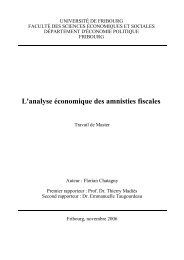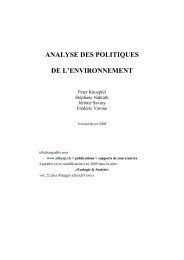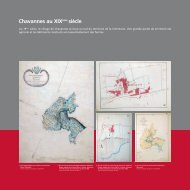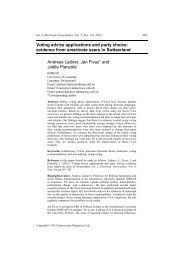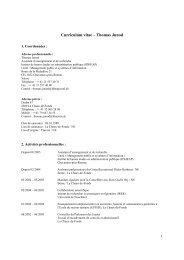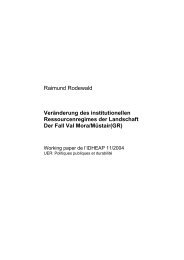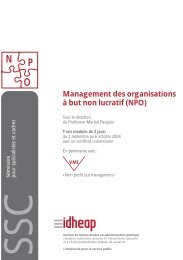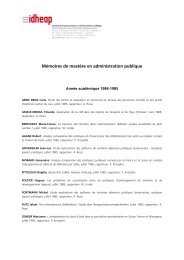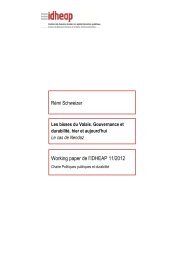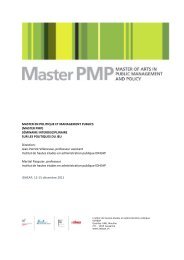Transparency in Switzerland - IDHEAP
Transparency in Switzerland - IDHEAP
Transparency in Switzerland - IDHEAP
Create successful ePaper yourself
Turn your PDF publications into a flip-book with our unique Google optimized e-Paper software.
Access to <strong>in</strong>formation <strong>in</strong> <strong>Switzerland</strong>. From secrecy to transparency.<br />
Dr. Martial Pasquier, Professor<br />
Public Management and Public Market<strong>in</strong>g Unit<br />
Swiss Graduate School of Public Adm<strong>in</strong>istration <strong>IDHEAP</strong><br />
Route de la Maladière 21<br />
1022 Chavannes-près-Renens<br />
<strong>Switzerland</strong><br />
martial.pasquier@idheap.unil.ch<br />
Jean-Patrick Villeneuve<br />
Research and teach<strong>in</strong>g assistant<br />
Public Management and Public Market<strong>in</strong>g Unit<br />
Swiss Graduate School of Public Adm<strong>in</strong>istration <strong>IDHEAP</strong><br />
Route de la Maladière 21<br />
1022 Chavannes-près-Renens<br />
<strong>Switzerland</strong><br />
jean-patrick.villeneuve@idheap.unil.ch<br />
1
Access to <strong>in</strong>formation <strong>in</strong> <strong>Switzerland</strong>.<br />
From secrecy to transparency.<br />
Abstract<br />
Access to <strong>in</strong>formation legislations are now present <strong>in</strong> over 50 countries world-wide. Lagg<strong>in</strong>g<br />
beh<strong>in</strong>d some of its own Cantons, the Swiss Federal government was until recently one of the<br />
few hold outs <strong>in</strong> Europe. But, <strong>in</strong> December 2004, the Confederation voted the ‘Loi sur la<br />
Transparence de l’adm<strong>in</strong>istration’ or Law on <strong>Transparency</strong> (LTrans) a Law that came <strong>in</strong>to<br />
effect <strong>in</strong> July 2006. This paper presents an overview of the new Law and underl<strong>in</strong>es the ma<strong>in</strong><br />
<strong>in</strong>stitutional challenges to its <strong>in</strong>troduction <strong>in</strong> <strong>Switzerland</strong>.<br />
Key words:<br />
<strong>Switzerland</strong>, Access to <strong>in</strong>formation, legislation, transparency, organisation.<br />
2
Introduction<br />
At first, l<strong>in</strong>k<strong>in</strong>g the concept of transparency with <strong>Switzerland</strong> might seem a bit odd. In fact, to<br />
outside observers, <strong>Switzerland</strong> represents the exact opposite of transparency. With its banks,<br />
arcane federal structure and landscape of isolated mounta<strong>in</strong> villages, it gives out an image of<br />
privacy and secrecy at all costs. Quite tell<strong>in</strong>gly, it rema<strong>in</strong>s one of the few countries <strong>in</strong> Europe<br />
without a proper Law on access to <strong>in</strong>formation (Banisar, 2004; Mendel, 2003b). While states<br />
as different <strong>in</strong> their adm<strong>in</strong>istrative cultures and <strong>in</strong>stitutional structures as Yemen, Ukra<strong>in</strong>e and<br />
France have all enacted laws on access to <strong>in</strong>formation, how can a country such as <strong>Switzerland</strong><br />
do without what has come to be seen as one of the corner stones of good adm<strong>in</strong>istrative<br />
practices ? (OECD, 2002)<br />
There are a number of elements expla<strong>in</strong><strong>in</strong>g the relative ‘lateness’ of the adoption of such a<br />
Law at the federal level <strong>in</strong> <strong>Switzerland</strong>. First of all, the culture of secrecy is strongly present<br />
<strong>in</strong> the Swiss adm<strong>in</strong>istrative and social system as a whole (Kriesi, 1998). This situation should<br />
never be underestimated, and its cultural impact downplayed. Secondly, <strong>Switzerland</strong>, with its<br />
federal system, is a country where an important part of the overall policy jurisdiction lies with<br />
the Cantons and the communal entities (Kissl<strong>in</strong>g-Näf and Wälti, 2004). In such a context, a<br />
large amount of <strong>in</strong>formation directly perta<strong>in</strong><strong>in</strong>g to the citizens is held, not by the federal<br />
government, but at the smaller and more accessible Cantonal and local levels. F<strong>in</strong>ally, the<br />
Swiss political system <strong>in</strong> itself also accounts for this situation. At the federal level and <strong>in</strong> most<br />
Cantons, political parties govern accord<strong>in</strong>g to the pr<strong>in</strong>ciple of ‘concordance’ (Kriesi, 1998).<br />
This means that every political party, from right and left, takes part <strong>in</strong> the form<strong>in</strong>g of the<br />
executive and as such has direct access to all the <strong>in</strong>formation produced by the adm<strong>in</strong>istration.<br />
It also means that the political need for transparency is that much lower.<br />
3
For a number of years some of the Swiss Cantons have enacted laws giv<strong>in</strong>g citizens access to<br />
the documents and <strong>in</strong>formation collected and compiled by their governments (Conseil fédéral,<br />
2003). But, at the federal level, the challenges appeared somehow more significant. S<strong>in</strong>ce<br />
December 2004, this ‘deficiency’ has been remedied at the Federal level with the sign<strong>in</strong>g of<br />
the ‘Loi sur la transparence de l’adm<strong>in</strong>istration’ or Law on <strong>Transparency</strong> (LTrans). The law<br />
has taken effect <strong>in</strong> July 2006.<br />
The challenges posed by transparency laws <strong>in</strong> countries more readily ‘adapted’ to its realities<br />
are great, and have been documented by numerous scholars (Blanton et al., 2003; Caddy,<br />
2001; Frankel, 2001; Hasan, 2005; Héritier, 2003; Mendel, 2003a; Roberts, 2002b; Sanchez,<br />
2002). In <strong>Switzerland</strong>, given its <strong>in</strong>stitutional structure, decision mak<strong>in</strong>g apparatus and federal<br />
construction, these challenges seem more formidable yet. This paper will briefly outl<strong>in</strong>e the<br />
major steps undertaken to put this bill <strong>in</strong> front of Parliament, and detail its major aspects,<br />
exceptions and caveats. As well, we shall look at some of the ‘Swiss specific’ challenges <strong>in</strong><br />
implement<strong>in</strong>g a law on transparency.<br />
4
<strong>Switzerland</strong> and transparency: A short history<br />
To trace back the emergence of the LTrans <strong>in</strong> <strong>Switzerland</strong>, one needs to understand the<br />
various aspects of the Swiss federal structure. The authority for numerous policies such as<br />
education, health, police, taxation, are Cantonal jurisdiction. Thus, the daily decisions<br />
<strong>in</strong>fluenc<strong>in</strong>g the lives of the citizenry are generally taken at the Cantonal level. It is also at that<br />
level that a number of democratic advances are be<strong>in</strong>g made, to be later adopted at the federal<br />
level. It is perhaps <strong>in</strong> part for this reason that pressures for greater transparency were first felt<br />
<strong>in</strong> the Cantons.<br />
The Canton of Bern, <strong>in</strong> 1993 (LIn, 1993), first <strong>in</strong>troduced an Access to <strong>in</strong>formation law <strong>in</strong><br />
<strong>Switzerland</strong>. Follow<strong>in</strong>g a scandal on the existence of slush funds used to f<strong>in</strong>ance political<br />
propaganda, the Cantonal authorities tried to re<strong>in</strong>stitute a modicum of confidence <strong>in</strong> the<br />
adm<strong>in</strong>istration by <strong>in</strong>troduc<strong>in</strong>g a law on <strong>in</strong>formation; a number of other jurisdictions have s<strong>in</strong>ce<br />
then followed suit: Geneva (LIPAD, 2001), Vaud (LInfo, 2002), Jura (Loi sur l'<strong>in</strong>formation,<br />
2002), etc. The majority of Cantons are right now devis<strong>in</strong>g plans to <strong>in</strong>troduce such legislation.<br />
The sign<strong>in</strong>g of the LTrans <strong>in</strong> 2004 represents a major step for the Swiss federal<br />
adm<strong>in</strong>istration. It is a step that was long <strong>in</strong> the mak<strong>in</strong>g. The question had come to the fore at<br />
many times s<strong>in</strong>ce the 1980s. We can f<strong>in</strong>d <strong>in</strong> 1982 a Commission of experts plead<strong>in</strong>g for a<br />
federal project on the <strong>in</strong>troduction of the pr<strong>in</strong>ciple of transparency <strong>in</strong> the activities of the<br />
adm<strong>in</strong>istration. Similar proposals were put forward by various groups <strong>in</strong> 1986, 1989 and 1991<br />
(Conseil fédéral, 2003).<br />
5
In 1992, the Federal Council adopted <strong>in</strong> its legislative agenda the specific objective of be<strong>in</strong>g<br />
‘closer to citizen via <strong>in</strong>creased transparency’; it wanted to exam<strong>in</strong>e the possibility of<br />
<strong>in</strong>troduc<strong>in</strong>g the pr<strong>in</strong>ciple of transparency <strong>in</strong> the activities of the adm<strong>in</strong>istration <strong>in</strong> the more<br />
general framework of governmental reform (Conseil fédéral, 2003). It is to be noted that<br />
similar steps forward, <strong>in</strong> putt<strong>in</strong>g transparency on the table as a subject of debate, were made<br />
through the 1990s. In April 2000, the Federal Council decided to send for consultation a bill<br />
on transparency <strong>in</strong> the federal adm<strong>in</strong>istration. The project presented the ma<strong>in</strong> concept of a<br />
legislation on <strong>in</strong>formation and, most notably, the basic pr<strong>in</strong>ciples as to the rights of access for<br />
citizens. The general reaction to the draft project was rather positive. The criticisms levelled<br />
were nevertheless often serious, but also quite divergent depend<strong>in</strong>g on the group mak<strong>in</strong>g the<br />
representations (Conseil fédéral, 2003:1825).<br />
Opposition was clearest from private sector enterprises and organisms regulated by special<br />
laws and belong<strong>in</strong>g <strong>in</strong> part or <strong>in</strong> total to the Confederation. Representatives of the media were<br />
worried that access procedures would <strong>in</strong> fact complicate access to <strong>in</strong>formation (forms to fill,<br />
tighter screen<strong>in</strong>g of documents released, etc) that was until then obta<strong>in</strong>ed <strong>in</strong>formally.<br />
Representatives of the economy were particularly <strong>in</strong>terested <strong>in</strong> the protection of private<br />
<strong>in</strong>terests (overrid<strong>in</strong>g private <strong>in</strong>terest, bus<strong>in</strong>ess and professional secrets, patents, etc). They<br />
worried that these particular considerations might not be fully accounted for <strong>in</strong> the decisions<br />
to make public or not certa<strong>in</strong> documents. Others, were worried about the overall cost of<br />
transparency (Conseil fédéral, 2003: 1824-1825). There were a number of adaptations made<br />
to the draft project, but <strong>in</strong> essence it rema<strong>in</strong>ed largely unchanged.<br />
6
Institutional challenges<br />
Aside from the usual reticence of public organisations to open to all their various procedures<br />
and <strong>in</strong>formation (costs, security of the state, private <strong>in</strong>terests, etc), there are a number of<br />
elements, particular to <strong>Switzerland</strong>, that make the application of transparency laws even more<br />
complicated. That does not mean that transparency is impossible, au contraire, but simply that<br />
these challenges must be recognized and addressed <strong>in</strong> establish<strong>in</strong>g the basis of freedom of<br />
<strong>in</strong>formation. Of all these challenges, two are of particular importance: 1) the pr<strong>in</strong>ciple of<br />
collegiality, and 2) the pr<strong>in</strong>ciple of executive federalism.<br />
Collegiality<br />
The federal executive is made up of 7 members com<strong>in</strong>g from 4 different political parties<br />
(from populist right to socialists). It is the pr<strong>in</strong>ciple used <strong>in</strong> reach<strong>in</strong>g a decision <strong>in</strong> this<br />
politically diverse executive that differs from other democratic countries used to a pr<strong>in</strong>ciple of<br />
majority governments and parliamentary opposition. The Federal Council takes all of its<br />
decisions as one and applies the concept of collegiality (Constitution, 1998: Art. 177; Klöti,<br />
2004). This means that decisions, after hav<strong>in</strong>g been debated among the 7 members of the<br />
government, must then be defended by all, even by those who opposed it <strong>in</strong> the conf<strong>in</strong>es of<br />
the Council. Those who had to rally to the majority do not make their opposition public, and<br />
hence would prefer to keep private their own argumentation on the case.<br />
There thus rema<strong>in</strong>s, at the heart of the political system, a zone of secrecy, shared by members<br />
of various political families. This particular configuration thus gives, at least at the executive<br />
level, a broad access to <strong>in</strong>formation to a representative of all major political parties and,<br />
consequently, gives everyone a certa<strong>in</strong> stake <strong>in</strong> the preservation of secrecy. That be<strong>in</strong>g said<br />
7
there nevertheless rema<strong>in</strong>s a number of smaller parties that are represented <strong>in</strong> Parliament but<br />
that are not <strong>in</strong> the executive. In that decision mak<strong>in</strong>g process, two steps must be dist<strong>in</strong>guished:<br />
the procedure of ‘co-rapport’ and the consultation phase. They both have direct <strong>in</strong>fluence on<br />
the development and understand<strong>in</strong>g of access to <strong>in</strong>formation.<br />
The procedure of ‘co-rapport’ refers to all the documents written by the government and their<br />
staff follow<strong>in</strong>g a proposition made by one the 7 members of government. These reports are<br />
then circulated between departments, at various levels of the hierarchy, for feedback. In such<br />
a system, the open<strong>in</strong>g to all of the <strong>in</strong>side work<strong>in</strong>gs of the government would be problematic,<br />
and shake the basis of the concept that has served as the foundation of Swiss politics for<br />
decades.<br />
The second level <strong>in</strong> the production of op<strong>in</strong>ion with<strong>in</strong> the Swiss federal government is the<br />
consultation of the various offices or departments. In the process lead<strong>in</strong>g to the preparation of<br />
the proposals devised by the Federal Council, the responsible adm<strong>in</strong>istration <strong>in</strong>vites the other<br />
adm<strong>in</strong>istrations impacted by the proposal to give their <strong>in</strong>put. It is based, <strong>in</strong> part, on these<br />
documents that the Federal Council will take its decision. The right to access to this<br />
<strong>in</strong>formation does exist, but only after the decision has been made.<br />
Other, if not most jurisdictions do protect the formation of op<strong>in</strong>ion at the center of<br />
government; nevertheless, the Swiss case is probably the only one where the process is so<br />
central to the very configuration of the governmental architecture.<br />
8
Executive federalism<br />
The second element touches the federal structure of <strong>Switzerland</strong> and, most particularly its<br />
‘fédéralisme d’exécution’ or executive federalism (Kissl<strong>in</strong>g-Näf and Wälti, 2004). Contrary to<br />
most federal states, the central government does not carry-out all of its decisions, but rather<br />
delegates this task to the various Cantons - it is implementation by federal delegation (L<strong>in</strong>der<br />
and Vatter, 2001). Such a system ensures a greater level of adaptation of the legislation to the<br />
particular realities of each Canton. This structure also entails numerous <strong>in</strong>teractions between<br />
the various levels of government, and most of these governments do not yet have legislation<br />
on access to <strong>in</strong>formation. The level of transparency wished by some might not, is not,<br />
welcomed by all (Bussl<strong>in</strong>ger, 2004). This <strong>in</strong> fact resembles the challenges posed by<br />
networked governance and transparency laws <strong>in</strong> <strong>in</strong>stitutions such as the European Union, the<br />
United Nations and the World Bank (Bunyan, 2002; CPA and Association, 2004; Roberts,<br />
2002a). To make sure that <strong>in</strong>formation provided by the Cantons do not ‘escape’ the federal<br />
attempt at transparency, which would cover a very large number of federal documents and<br />
hence dim<strong>in</strong>ish the effectiveness of the legislation, the LTrans applies to all documents held<br />
by the federal adm<strong>in</strong>istration, be they produced by or simply have been communicated to it.<br />
These elements do account, <strong>in</strong> a certa<strong>in</strong> measure, for the relative lateness of the <strong>in</strong>troduction<br />
of access to <strong>in</strong>formation <strong>in</strong> <strong>Switzerland</strong>. Now that the LTrans has come <strong>in</strong>to effect, it is<br />
<strong>in</strong>terest<strong>in</strong>g to note that these <strong>in</strong>stitutional elements have been taken <strong>in</strong>to account <strong>in</strong> the<br />
construction of a transparency à la Suisse.<br />
9
The ma<strong>in</strong> elements of the Swiss LTrans<br />
Laws on access to <strong>in</strong>formation always have relatively similar characteristics (Frankel, 2001).<br />
Among those, we shall underl<strong>in</strong>e the important elements perta<strong>in</strong><strong>in</strong>g to the coverage of the law<br />
(what organisations and what type of documents), exceptions (what is officially off l<strong>in</strong>e), the<br />
practicalities (how to use it) as well as its regulatory framework (appeal process).<br />
Coverage<br />
The law will cover the totality of the federal adm<strong>in</strong>istration as well as other organisations as<br />
long as they provide decisions of ‘first <strong>in</strong>stance’ (decisions based on federal public laws and<br />
which, <strong>in</strong>ter alia, create or modify rights or obligations or rule on the existence and extent of<br />
rights and obligations.) With this pr<strong>in</strong>ciple <strong>in</strong> place, state enterprises active on private markets<br />
will come under the Law for all the decisions that they give <strong>in</strong> their role as public authorities.<br />
However, the Law does not apply to a number of <strong>in</strong>stitutions, notably: the Swiss National<br />
Bank, the Federal Bank<strong>in</strong>g Commission, the Federal Assembly, Parliamentary Commissions<br />
and the Federal Council (LTRANS, 2004: Art.2). Moreover, Parliament can also effectively<br />
withdraw from the obligations of the Law particular adm<strong>in</strong>istrative units or organisations if<br />
their mandates require it, if it might possibly damage their competitive position or if their<br />
tasks are deemed to be of m<strong>in</strong>or importance (LTRANS, 2004: Art.2, al.3). The flexibility<br />
given to the authority on this matter appears to be quite consequent.<br />
Only completed official documents are to come under the Law. For the LTrans, an ‘Official<br />
Document’ must meet with all three of the follow<strong>in</strong>g criteria (LTRANS, 2004: Art.5) :<br />
1. The <strong>in</strong>formation has been registered on a specific support;<br />
2. the <strong>in</strong>formation is located with<strong>in</strong> a specific adm<strong>in</strong>istration;<br />
3. the <strong>in</strong>formation is l<strong>in</strong>ked to the execution of a public task.<br />
10
The first of these cumulative criteria aims at dist<strong>in</strong>guish<strong>in</strong>g between the concept of document<br />
and the larger concept of <strong>in</strong>formation. It refers to a report, an expertise, statistics, visual or<br />
audio documents, electronic sources, etc. The second criteria aims at ensur<strong>in</strong>g that the<br />
adm<strong>in</strong>istration can effectively access the <strong>in</strong>formation requested. The third element, the l<strong>in</strong>k to<br />
a public task, means that it must not be l<strong>in</strong>ked to a general notion of public <strong>in</strong>terest, but rather<br />
to an effective task carried out by the Confederation (Conseil fédéral, 2003: 1834-1838).<br />
Documents that are not <strong>in</strong> their def<strong>in</strong>itive state or that are dest<strong>in</strong>ed to a personal use are not<br />
subjected to the Law (LTRANS, 2004: Art.5, al.3). The idea beh<strong>in</strong>d this provision is to ensure<br />
that the adm<strong>in</strong>istration reta<strong>in</strong>s the possibility to modify projects and avoid misunderstand<strong>in</strong>gs<br />
and external pressures based on draft documents (Conseil fédéral, 2003: 1840). Of course, the<br />
concept of what is and what is not a ‘def<strong>in</strong>itive state’ will have to be validated and tested with<br />
use.<br />
That be<strong>in</strong>g said, a personal letter regard<strong>in</strong>g official <strong>in</strong>formation will be subject to the Law<br />
(Conseil fédéral, 2003: 1840). Documents sold by an organisation (maps, books, statistics,<br />
etc) are not considered official documents <strong>in</strong> the application of the Law (Conseil fédéral,<br />
2003: 1839).<br />
The law will not cover access to documents related to legal procedures, be they civil, crim<strong>in</strong>al<br />
or l<strong>in</strong>ked to <strong>in</strong>ternational cases. Moreover, <strong>in</strong>formation l<strong>in</strong>ked to personal data will still be<br />
protected by the Federal Law of June 19 th 1992 on Data protection (LPD, 1992: Art.<br />
3,9,11,12). By personal data is meant <strong>in</strong>ter alia, data related to op<strong>in</strong>ion (religious, political,<br />
11
etc), elements touch<strong>in</strong>g health related matters, or any assemblage of <strong>in</strong>formation allow<strong>in</strong>g for<br />
the appreciation of one’s personality or physical traits.<br />
Exceptions<br />
The right of access can be legally limited, delayed or refused for different reasons. These<br />
reasons are somewhat similar to those used <strong>in</strong> other jurisdictions (Canada, 1985; Frankel,<br />
2001; Ireland, 2003).<br />
As we have seen, access can be refused if the document is susceptible to hamper the free<br />
formation of op<strong>in</strong>ion (LTRANS, 2004: Art.7, al.1). By protect<strong>in</strong>g the formation of op<strong>in</strong>ion,<br />
the legislation aims at prevent<strong>in</strong>g the premature dissem<strong>in</strong>ation of the government’s position,<br />
thus <strong>in</strong>sur<strong>in</strong>g its ability to develop positions without the pressure of the media or the<br />
population.<br />
Disclosure can also be blocked if the document is deemed to potentially compromise the<br />
relations between the Confederation and the Cantons or the relations between Cantons<br />
(LTRANS, 2004: Art.7, al.1e). This is a crucial element for most of the Cantons have no<br />
legislation on transparency. Unfortunately it also means yet one more area where transparency<br />
will not be applied.<br />
As well, disclosure will be refused when the document could compromise <strong>in</strong>ternal or external<br />
security, the <strong>in</strong>terests of <strong>Switzerland</strong> <strong>in</strong> terms of foreign, economic or monetary policy, as<br />
well as <strong>in</strong> terms of foreign affairs or <strong>in</strong>ternational affairs (LTRANS, 2004: Art.7, al.1c,d,f).<br />
This aspect is particularly important as it has been shown <strong>in</strong> other jurisdictions to be used as a<br />
trump card <strong>in</strong> favour of secrecy (Blanton, 2003; Canada, 1994; Canada, 2004; Pasquier and<br />
12
Villeneuve, 2004; Pasquier and Villeneuve, 2005; Roberts, 2003). The term<strong>in</strong>ology between<br />
jurisdictions does vary, but the concepts surround<strong>in</strong>g notions of ‘<strong>in</strong>ternational relations’ are,<br />
<strong>in</strong> the case of access to <strong>in</strong>formation laws, always framed <strong>in</strong> the most imprecise way, thus<br />
creat<strong>in</strong>g additional wiggl<strong>in</strong>g room to ‘hide’ <strong>in</strong>formation. This situation is likely to get even<br />
more acute as multi-lateral fora multiply and <strong>in</strong>ternational agencies regulate more and more<br />
sectors of activities.<br />
The non-disclosure of <strong>in</strong>formation is allowed when that <strong>in</strong>formation has been given by a third<br />
party to an organisation that has guaranteed its secret (LTRANS, 2004: Art.7, al.1h). This<br />
particular elements means, among other th<strong>in</strong>gs that secret <strong>in</strong>formation passed on by other<br />
governments will not be accessible. This provision does not apply to <strong>in</strong>formation provided by<br />
<strong>in</strong>dividuals as part of a legal obligation (Conseil fédéral, 2003: 1853).<br />
The standard protection is guaranteed for element that could lead to the release of<br />
professional, bus<strong>in</strong>ess or patent <strong>in</strong>formation(LTRANS, 2004: Art.7, al.1g). As well, a<br />
document might be withheld if it might damage private <strong>in</strong>terests, unless an overrid<strong>in</strong>g public<br />
<strong>in</strong>terest is found to exist (LTRANS, 2004: Art.7, al.2).<br />
Nevertheless, all these cases of predom<strong>in</strong>ant <strong>in</strong>terest (public or private) must always be<br />
balanced with the overrid<strong>in</strong>g public <strong>in</strong>terest of transparency. As we can see, these exemptions<br />
are not unprecedented, for most of them can be found <strong>in</strong> other jurisdictions. Nevertheless,<br />
they were carefully crafted to ensure the protection of some of the Swiss specific mechanisms<br />
such as the concept of collegiality and Federal-Cantonal negotiations. It rema<strong>in</strong>s to be seen<br />
whether all these limitations will have a large or small impact on the benefits of transparency.<br />
13
Practicalities<br />
The requests for <strong>in</strong>formation must be directly addressed to the authority <strong>in</strong> charge of their<br />
production, and be as precise as possible (LTRANS, 2004: Art.10). The access is fee based;<br />
nevertheless, no fee will be collected for demands that entail small expenses for the<br />
adm<strong>in</strong>istration or that are directly l<strong>in</strong>ked to mediation procedures. Overall, it is the Federal<br />
Council that will establish the modalities and tariffs to be charged (LTRANS, 2004: Art.10).<br />
The time limit afforded to the organisation is 20 days start<strong>in</strong>g with the day the demand has<br />
been received. The time provided to reply can be exceptionally extended if the demand<br />
requires more work <strong>in</strong> terms of volume or <strong>in</strong> terms of complexity (LTRANS, 2004: Art.12).<br />
Regulatory framework<br />
As with most freedom of <strong>in</strong>formation legislation, the Swiss Law has provisions to deal with<br />
compla<strong>in</strong>ts on the non-compliance with the law. A citizen can ask for mediation if the demand<br />
has been limited, delayed or refused (LTRANS, 2004: Art.13, al.1). The demand for<br />
mediation must be presented to the ‘Préposé fédéral à la protection des données et à la<br />
transparence’, the Officer <strong>in</strong> charge of data protection and transparency, with<strong>in</strong> a delay of 20<br />
days start<strong>in</strong>g at the reception of the decision.<br />
This is, first and foremost, a mediation procedure where the ‘Préposé’ will try to reconcile the<br />
differences. It is hoped that this mediation approach will help take care of the bulk of<br />
demands without hav<strong>in</strong>g to systematically resort to a more demand<strong>in</strong>g system. This ‘Préposé’<br />
is an <strong>in</strong>dependent agent that is not under the hierarchical purview of the Federal Council. He<br />
also has the use of his own secretariat. It is to be noted that the ‘Préposé’ has no power to<br />
force a decision. Aside from its role as supervisor of the Law and authority, the ‘Préposé’ is<br />
14
charged with the evaluation of the Law and with present<strong>in</strong>g an annual report to the Council on<br />
its application. More than only tak<strong>in</strong>g care of mediation, this ‘Préposé’ is <strong>in</strong> a sense a<br />
competency center on questions of transparency (Conseil fédéral, 2003: 1869).<br />
A failure of the mediation process can subsequently be taken to the federal Commission on<br />
data protection and transparency. The Commission has the same provision as the Préposé <strong>in</strong><br />
terms of <strong>in</strong>dependence. In such a case the Commission would have access to the documents,<br />
even if they are deemed secret. The Commission has to reach a decision with<strong>in</strong> 2 months.<br />
This decision is not f<strong>in</strong>al, as it can be appealed to Federal Tribunal, the highest authority <strong>in</strong><br />
<strong>Switzerland</strong>.<br />
F<strong>in</strong>al dispositions<br />
Interest<strong>in</strong>gly, the present legislation only covers official documents that have been produced<br />
or received after the enactment of the legislation (LTRANS, 2004: Art.23). That means that<br />
contrary to the situation with the new <strong>in</strong>formation legislation <strong>in</strong> the United K<strong>in</strong>gdom and the<br />
statutes <strong>in</strong> most countries with freedom of <strong>in</strong>formation regimes, no document from previous<br />
adm<strong>in</strong>istrations will be accessible (Happold, 2005).<br />
15
Conclusion<br />
Overall, the LTrans is somewhat similar to other freedom of <strong>in</strong>formation legislations around<br />
the world. The great difference is of course the attempt made to accommodate some of the<br />
particular <strong>in</strong>stitutions of the country such as the federal-cantonal relations and the concept of<br />
collegiality. It rema<strong>in</strong> to be seen if these attempts at adapt<strong>in</strong>g transparency to the local sociopolitical<br />
<strong>in</strong>stitutional arrangements are necessary cultural modulation of transparency, or<br />
simply a convenient way of deflect<strong>in</strong>g the full glare of transparency’s lights.<br />
The impact of various legal provisions on the overall transparency of an adm<strong>in</strong>istration have<br />
been analysed by numerous scholars. Of all these analysis, cover<strong>in</strong>g most cont<strong>in</strong>ents, and<br />
various adm<strong>in</strong>istrative systems, one can only conclude that it is truly the practice that they<br />
succeed or fail to yield all the benefits of transparency. The overall consequences for Swiss<br />
public adm<strong>in</strong>istration are likely to be positive. But, as of now, few seem to be aware of this<br />
new legislation, and fewer still aware of the cultural revolution it is likely to entail for the<br />
whole system.<br />
In its capacity to adapt to this new reality, <strong>Switzerland</strong> will prove a test<strong>in</strong>g ground for<br />
transparency. Of particular <strong>in</strong>terest will be its ability to face not only an adm<strong>in</strong>istrative<br />
cultural revolution, but one that also goes aga<strong>in</strong>st a more generalised social conception of the<br />
role and function of the state.<br />
In the open<strong>in</strong>g remarks of the <strong>in</strong>augural issue of Open Government, Steve Wood mentioned<br />
the impressive report<strong>in</strong>g on the Freedom of Information Act <strong>in</strong> the United K<strong>in</strong>gdom. It is to be<br />
hoped that after a few months, Swiss citizens will be as adept as the British at us<strong>in</strong>g<br />
transparency to its fullest.<br />
16
Bibliography<br />
LPD - Loi fédérale sur la protection des données, 1992 (235.1), Swiss Federal Parliament<br />
LIn - Loi sur l'<strong>in</strong>formation du public, 1993 (107.1), Parliament of the Canton of Bern<br />
Constitution Suisse, 1998, Swiss Federal Parliament<br />
LIPAD - Loi sur l’<strong>in</strong>formation du public et l’accès aux documents, 2001 (A 2 08), Parliament<br />
of the Canton of Geneva<br />
LInfo - Loi sur l'<strong>in</strong>formation, 2002 (170.21), Parliament of the Canton of Vaud<br />
Loi sur l'<strong>in</strong>formation et l'accès aux documents officiels 2002 (170.801) Parliament of the<br />
Canton of Jura<br />
LTRANS - Loi fédérale sur la transparence de l'adm<strong>in</strong>istration, 2004 (03.013s), Swiss Federal<br />
Parliament<br />
Banisar, D. (2004) The www.freedom<strong>in</strong>fo.org global survey: freedom of <strong>in</strong>formation and<br />
access to government record laws around the world. [Accessed 01/05/06]<br />
Blanton, T., Fuchs, M. & Elias, B. (2003) Justice Delayed is Justice Denied: The Ten Oldest<br />
Pend<strong>in</strong>g FOIA Requests. Wash<strong>in</strong>gton, DC 20037, The National Security Archive.<br />
Blanton, T. S. (2003) National security and open government <strong>in</strong> the United States: Beyond the<br />
balanc<strong>in</strong>g test. In: National security and open government: strik<strong>in</strong>g the right balance.<br />
New York, The Maxwell School of Syracuse University.<br />
Bunyan, T. (2002) Secrecy and openess <strong>in</strong> the European Union. Freedom<strong>in</strong>fo.org.<br />
[Accessed 01/05/06]<br />
Bussl<strong>in</strong>ger, L. (2004) Tout savoir sur les salaires des fonctionnaires romands? Le rapport<br />
existe, mais il est top secret. Le Temps. 2109 ed. Genève.<br />
Caddy, J. (2001) Access to Information. Paris, OECD.<br />
17
Canada, Commissaire à l’<strong>in</strong>formation du (1994) La loi sur l'accès à l'<strong>in</strong>formation. Dix ans<br />
d'accès à l'<strong>in</strong>formation. Vers l'avenir... Ottawa, Travaux publics et des services<br />
gouvernementaux Canada.<br />
Canada, Commissaire à l’<strong>in</strong>formation du (2004) Rapport annuel du Commissaire à<br />
l'<strong>in</strong>formation 2003-2004. Ottawa, Commissariat à l'<strong>in</strong>formation du Canada.<br />
Loi sur l'accès à l'<strong>in</strong>formation, 1985 (L.R., 1985, ch. A-1), Parlement du Canada<br />
Conseil Fédéral (2003) Message relatif à la loi fédérale sur la transparence de l'adm<strong>in</strong>istration.<br />
Cpa & Association, C. P. (2004) Recommendations for Transparent Government. Accra,<br />
Commonwealth Parliamentary Association and the World Bank Institute.<br />
Frankel, M. (2001) Freedom of <strong>in</strong>formation: some <strong>in</strong>ternational characteristics. <strong>Transparency</strong><br />
<strong>in</strong> Europe a Conference. The Hague.<br />
Happold, T. (2005) Major calls for election halt to FoI. The Guardian. 10 February 2005 ed.<br />
London.<br />
Hasan, I. (2005) The UK Freedom of Information Act (2000) and Procurement. Open<br />
Government: a Journal on Freedom of Information, Vol. 1.<br />
Héritier, A. (2003) Composite democracy <strong>in</strong> Europe: the role of transparency and access to<br />
<strong>in</strong>formation. Journal of European Public Policy, Vol. 10.<br />
Ireland, Information Commissioner of (2003) Annual Report 2003. Dubl<strong>in</strong>, Office of the<br />
Information Commissioner.<br />
Kissl<strong>in</strong>g-Näf, I. & Wälti, S. (2004) The implementation of public policies. In: Klöti, U.,<br />
Knoepfel, P., Kriesi, H., L<strong>in</strong>der, W. & Papadopoulos, Y. (Eds.) Handbook of Swiss<br />
Politics. Zurich, Neue Zürcher Zeitung.<br />
Klöti, U. (2004) The Government. In: Klöti, U., Knoepfel, P., Kriesi, H., L<strong>in</strong>der, W. &<br />
Papadopoulos, Y. (Eds.) Handbook of Swiss Politics. Zurich, Neue Zürcher Zeitung.<br />
Kriesi, H. (1998) Le système politique suisse, Paris, Economica.<br />
18
L<strong>in</strong>der, W. & Vatter, A. (2001) Institutions and outcomes of Swiss federalism: The role of the<br />
Canton <strong>in</strong> Swiss politics. West European Politics, Vol. 24.<br />
Mendel, T. (2003a) Freedom of <strong>in</strong>formation legislation: progress, concerns and standards. In:<br />
<strong>Transparency</strong> <strong>in</strong>ternational (Ed.) Global Corruption Report 2003. Berl<strong>in</strong>.<br />
Mendel, T. (2003b) Freedom of Information: a comparative legal survey, Paris, OECD.<br />
OECD (2002) Public sector transparency and accountability: Mak<strong>in</strong>g it happen. Paris, OECD.<br />
Pasquier, M. & Villeneuve, J.-P. (2004) Les entraves politiques et adm<strong>in</strong>istratives à la<br />
transparence gouvernementale. Revue économique et sociale, décembre 2004.<br />
Pasquier, M. & Villeneuve, J.-P. (2005) Typologie des comportements organisationnels des<br />
adm<strong>in</strong>istrations publiques visant à limiter l'accès à l'<strong>in</strong>formation. Work<strong>in</strong>g Paper<br />
<strong>IDHEAP</strong>. www.idheap.ch [Accessed 01/05/06]<br />
Roberts, A. (2002a) Multilateral Institutions and the Right to <strong>in</strong>formation: Experience <strong>in</strong> the<br />
European Union. European Public Law, Vol. 8.<br />
Roberts, A. (2002b) New Strategies for Enforcement of the Access to Information Act.<br />
Queen's Law Journal, Vol. 27.<br />
Roberts, A. (2003) NATO, secrecy and the right to <strong>in</strong>formation. East European Constitutional<br />
Review, Fall/W<strong>in</strong>ter 2002-2003.<br />
Sanchez, A. C. (2002) The right of access to <strong>in</strong>formation and public scrut<strong>in</strong>y: transparency as<br />
a democratic control <strong>in</strong>strument. In: OECD (Ed.) Public sector transparency and<br />
accountability: mak<strong>in</strong>g it happen. Paris, OECD.<br />
19



